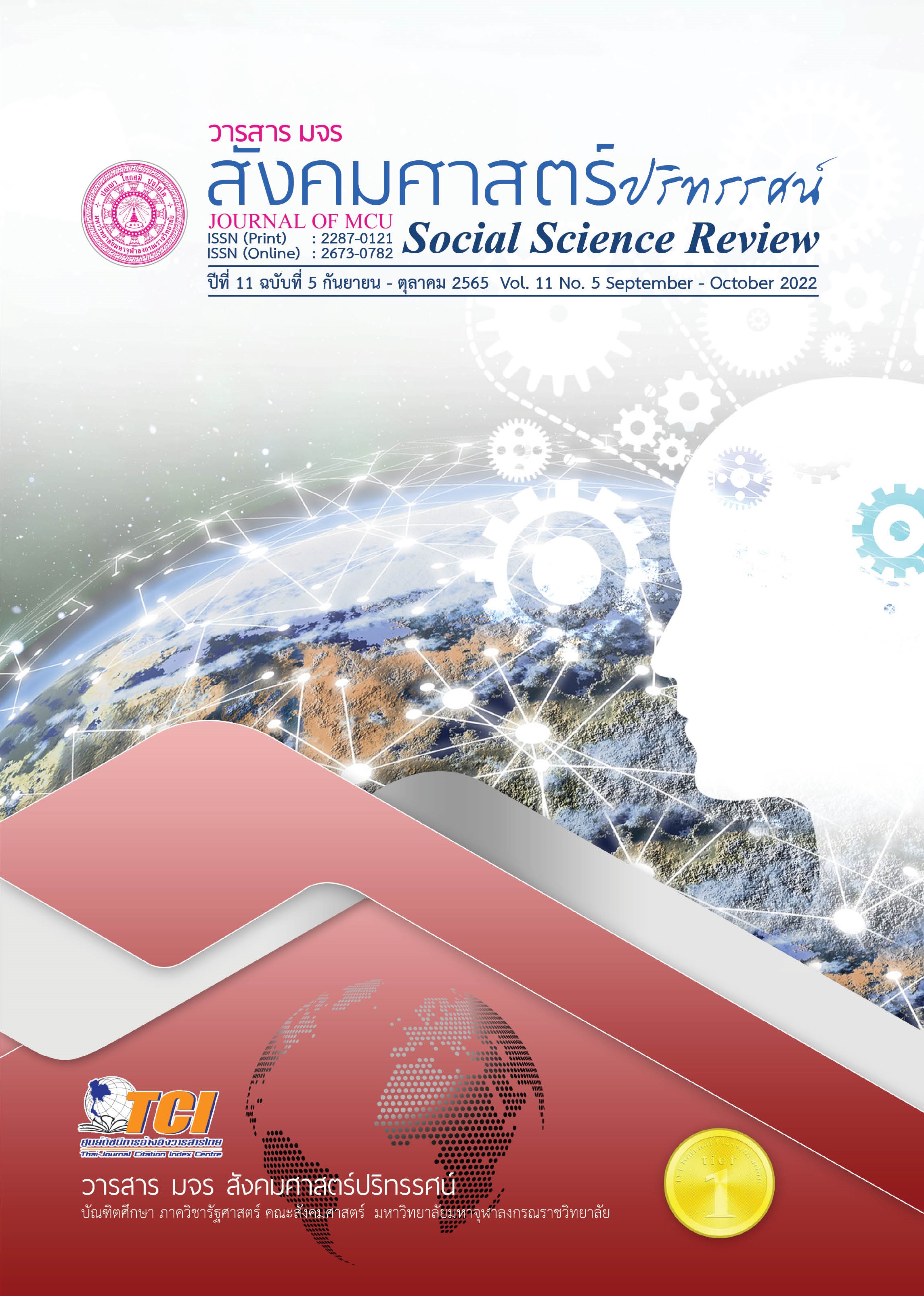การสื่อสารเพื่อการบริหารงานเชิงพุทธด้วยผู้นำ
คำสำคัญ:
การสื่อสารเชิงพุทธ, การบริหารเชิงพุทธ, ผู้นำบทคัดย่อ
บทความวิจัยนี้มีวัตถุประสงค์เพื่อศึกษา 1. แนวทางการนำหลักธรรม 2. การสื่อสารบริหารเชิงพุทธกับหลักการ POSDC ของผู้นำ และ 3. การประยุกต์ใช้หลักธรรมพุทธศาสนา เป็นการวิจัยแบบเชิงคุณภาพ ผู้ให้ข้อมูลหลัก จำนวน 16 คน คือ ผู้นำภาคธุรกิจ และผู้นำภาคการศึกษาใช้วิธีคัดเลือกแบบเจาะจง เครื่องมือที่ใช้ในการวิจัยมีแบบสัมภาษณ์ปลายเปิด และการสัมภาษณ์เชิงลึกจากรายการธรรมะกับซีอีโอผ่านช่อง YouTube วิเคราะห์ข้อมูลเชิงพรรณนา
ผลการวิจัยพบว่า 1. แนวทางตรง คือ ผู้นำศรัทธาในทางพุทธศาสนาด้วยตนเองอยู่แล้ว ฝึกปฏิบัติอยู่เป็นประจำ เกิดผลทางบวก ส่วนแนวทางอ้อม คือ ผู้นำได้ลองปฏิบัติ อาจเกิดจากการบอกต่อจากผู้นำต่างองค์การด้วยกัน แล้วเกิดความศรัทธา จึงลงมือทำ เห็นผลว่าเกิดผลดีกับการบริหารองค์การ คือหลักพรหมวิหาร 4 (เมตตา กรุณา มุทิตา อุเบกขา) บูรณการกับการบริหารแบบ POSDC (การวางแผน การจัดองค์การ การคัดสรรพนักงาน การอำนวยการ และการควบคุม) 2. การประยุกต์การสื่อสารบริหารเชิงพุทธผ่านการพูดและการฟังเท่านั้น 3. หลักพรหมวิหาร 4 สามารถลดความตึงเครียดอันเกิดมาจากการบริหารของผู้นำ ทำให้ทำงานมีสมาธิ ทำงานด้วยจิตที่นิ่ง มีเมตตา นอกเหนือจากนี้ยังก่อให้เกิดการบริหารงานองค์การอย่างเป็นระบบ นั่นหมายถึง หลักพรมวิหาร 4 ทำให้กำหนดทิศทางงานออกมาเป็นระบบ ตรวจสอบได้ เป็นรูปธรรม ปรับปรุงงานได้อย่างต่อเนื่อง บรรยากาศทำงานเป็นไปในทางบวก
เอกสารอ้างอิง
จักรกฤษณ์ โพดาพล. (2559). ผู้บริหารกับพรหมวิหารธรรม. วารสารสถาบันวิจัยญาณสังวร, 9(1), 1-12.
ประทุม ฤกษ์กลาง. (2559). หลักการสื่อสารตามแนวพุทธศาสนา. วารสาร BU Academic Review, 3(2), 39-146.
พระพรหมคุณาภรณ์ (ป.อ. ปยุตฺโต). (2548). ภาวะผู้นำ: ความสำคัญต่อการพัฒนาคน พัฒนาประเทศ. กรุงเทพฯ: ธรรมสภา.
พระเทพโสภณ (ประยูร ธมฺมจิตฺโต). (2548). พุทธวิธีบริหาร. กรุงเทพฯ: โรงพิมพ์วินดาต้าโปรดักส์.
พระใบฎีกาธวัชชัย จรณธมฺโม และพระมหาประเวศ ปญฺญาทีโป. (2564). การบริหารจัดการเชิงพุทธ : องค์การสมัยใหม่. ลำพูน: วิทยาลัยสงฆ์ลำพูน มหาวิทยาลัยมหาจุฬาลงกรณราช.วิทยาลัย.
พายุ ภูคำวงษ์. (2560). การปรับใช้หลักพุทธจริยธรรมเพื่อพัฒนาผู้บริหารสถานศึกษาขนาดเล็กให้การทำงานมีประสิทธิภาพ. วารสารมนุษยศาสตร์และสังคมศาสตร์ มหาวิทยาลัยราชภัฏอุบลราชธานี, 8(2), 148-159.
พระครูสถิตบุญวัฒน์ (ชาญ ถิรปุญฺโญ) และคณะ. (2559). การบริหารเชิงพุทธบูรณาการของโรงเรียนประถมศึกษาในสังกัดสำนักงาน คณะกรรมการการศึกษาขั้นพื้นฐาน กรุงเทพมหานคร. วารสารมนุษยศาสตร์และสังคมศาสตร์ มหาวิทยาลัยราชภัฏอุบลราชธานี, 7(2), 165-176.
ลิขิตา เฉลิมพลโยธิน และคณะ. (2560). ภาวะผู้นำกับการพัฒนาองค์การโดยใช้หลักพรหมวิหาร 4. วารสารวิชาการมหาวิทยาลัยกรุงเทพธนบุรี, 11(26), 162-171.
โสมจิราวดี จำปาสิทธิ์ และคณะ. (2563). การประยุกต์ใช้หลักพรหมวิหาร 4 ในการปฏิบัติหน้าที่ของผู้บริหารองค์การบริหารส่วนตำบลเสาธง อำเภอร่อนพิบูลย์ จังหวัดนครศรีธรรมราช. Journal of Social Science and Buddhistic Anthropology, 5(1), 85-101.
สำนักงานพระพุทธศาสนาแห่งชาติ. (2550). ระเบียบมหาเถรสมาคมว่าด้วยการเผยแผ่พระพุทธศาสนา พ.ศ. 2550. กรุงเทพฯ: โรงพิมพ์สำนักงานพระพุทธศาสนาแห่งชาติ.
Berlo, D. K. (1960). The Process of Communication. New York: The Free Press.
Likert, R. (1967). The human organization: Its management and value. New York: McGraw-Hill.
ดาวน์โหลด
เผยแพร่แล้ว
รูปแบบการอ้างอิง
ฉบับ
ประเภทบทความ
สัญญาอนุญาต
ลิขสิทธิ์ (c) 2022 วารสาร มจร สังคมศาสตร์ปริทรรศน์

อนุญาตภายใต้เงื่อนไข Creative Commons Attribution-NonCommercial-NoDerivatives 4.0 International License.
เพื่อให้เป็นไปตามกฎหมายลิขสิทธิ์ ผู้นิพนธ์ทุกท่านต้องลงลายมือชื่อในแบบฟอร์มใบมอบลิขสิทธิ์บทความให้แก่วารสารฯ พร้อมกับบทความต้นฉบับที่ได้แก้ไขครั้งสุดท้าย นอกจากนี้ ผู้นิพนธ์ทุกท่านต้องยืนยันว่าบทความต้นฉบับที่ส่งมาตีพิมพ์นั้น ได้ส่งมาตีพิมพ์เฉพาะในวารสาร มจร สังคมศาสตร์ปริทรรศน์ เพียงแห่งเดียวเท่านั้น หากมีการใช้ภาพหรือตารางหรือเนื้อหาอื่นๆ ของผู้นิพนธ์อื่นที่ปรากฏในสิ่งตีพิมพ์อื่นมาแล้ว ผู้นิพนธ์ต้องขออนุญาตเจ้าของลิขสิทธิ์ก่อน พร้อมทั้งแสดงหนังสือที่ได้รับการยินยอมต่อบรรณาธิการ ก่อนที่บทความจะได้รับการตีพิมพ์ หากไม่เป็นไปตามข้อกำหนดเบื้องต้น ทางวารสารจะถอดบทความของท่านออกโดยไม่มีข้อยกเว้นใดๆ ทั้งสิ้น





